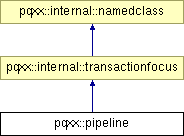
#include <pipeline.hxx>
Inheritance diagram for pqxx::pipeline:

Public Types | |
| typedef long | query_id |
Public Member Functions | |
| pipeline (transaction_base &, const PGSTD::string &PName="") | |
| ~pipeline () throw () | |
| query_id | insert (const PGSTD::string &) |
| Add query to the pipeline. | |
| void | complete () |
| Wait for all ongoing or pending operations to complete. | |
| void | flush () |
| Forget all ongoing or pending operations and retrieved results. | |
| bool | is_finished (query_id) const |
| Is result for given query available? | |
| result | retrieve (query_id qid) |
| Retrieve result for given query. | |
| PGSTD::pair< query_id, result > | retrieve () |
| Retrieve oldest unretrieved result (possibly wait for one). | |
| bool | empty () const throw () |
| int | retain (int retain_max=2) |
| Set maximum number of queries to retain before issuing them to the backend. | |
| void | resume () |
| Resume retained query emission (harmless when not needed). | |
Feel free to pump as many queries into the pipeline as possible, even if they were generated after looking at a result from the same pipeline. To get the best possible throughput, try to make insertion of queries run as far ahead of results retrieval as possible; issue each query as early as possible and retrieve their results as late as possible, so the pipeline has as many ongoing queries as possible at any given time. In other words, keep it busy!
One warning: if any of the queries you insert leads to a syntactic error, the error may be returned as if it were generated by an older query. Future versions may try to work around this if working in a nontransaction.
|
|
|
|
||||||||||||
|
|
|
|
|
|
|
Wait for all ongoing or pending operations to complete.
|
|
|
|
|
|
Forget all ongoing or pending operations and retrieved results. Queries already sent to the backend may still be completed, depending on implementation and timing. Any error state (unless caused by an internal error) will also be cleared. This is mostly useful in a nontransaction, since a backend transaction is aborted automatically when an error occurs. |
|
|
Add query to the pipeline. Queries are accumulated in the pipeline and sent to the backend in a concatenated format, separated by semicolons. The queries you insert must not use this construct themselves, or the pipeline will get hopelessly confused!
|
|
|
Is result for given query available?
|
|
|
Resume retained query emission (harmless when not needed).
|
|
|
Set maximum number of queries to retain before issuing them to the backend. The pipeline will perform better if multiple queries are issued at once, but retaining queries until the results are needed (as opposed to issuing them to the backend immediately) may negate any performance benefits the pipeline can offer. Recommended practice is to set this value no higher than the number of queries you intend to insert at a time.
|
|
|
Retrieve oldest unretrieved result (possibly wait for one).
|
|
|
Retrieve result for given query. If the query failed for whatever reason, this will throw an exception. The function will block if the query has not finished yet.
|
 1.3.9.1
1.3.9.1